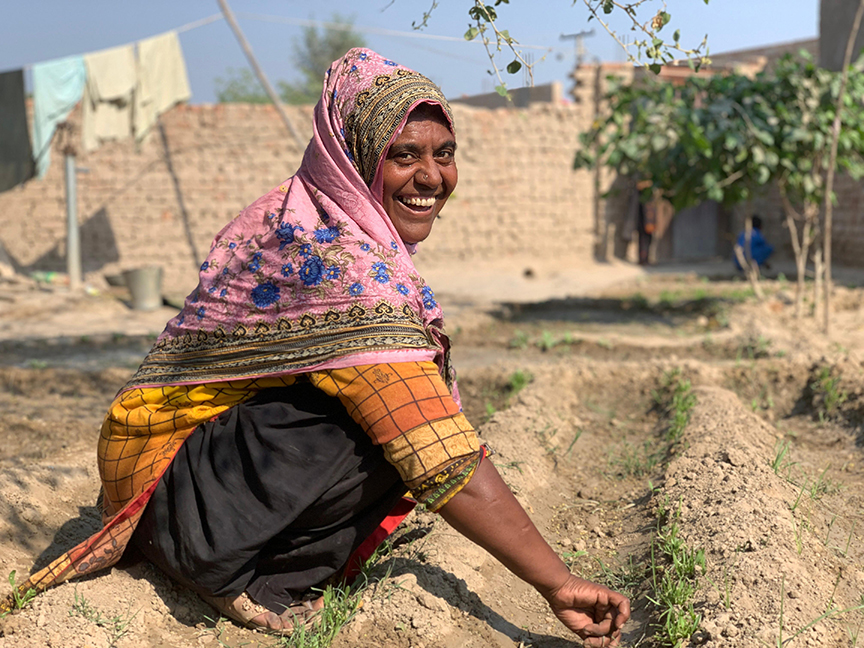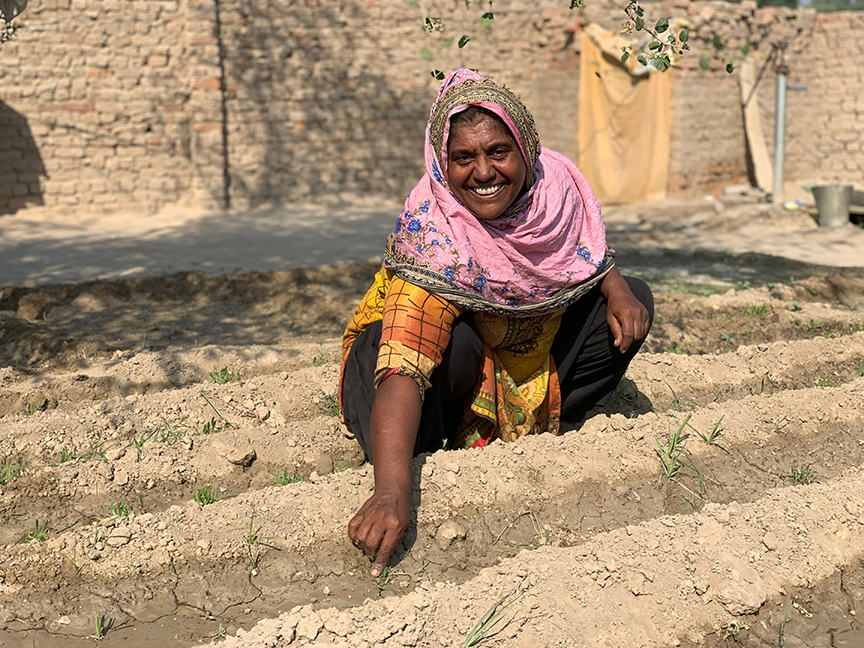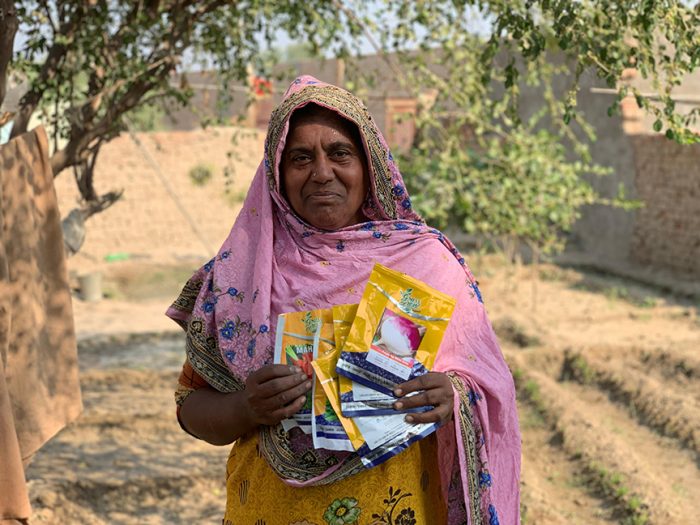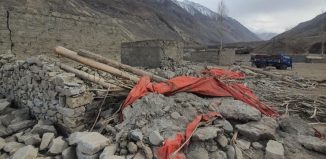Empowering Communities through Climate-Smart Agriculture
In the village of Sagiyon in District Khairpur Mirs, 38-year-old Malka has transformed her life and community. A mother of eight, Malka lives with her husband, Niaz Ali, and relies on farming on their two-acre agricultural land to provide for her family. While her husband earns a daily wage of PKR 400–500 (approximately USD 1.4-1.8) by running a small fruit stall in the village.
Until recently, she struggled with financial burdens, poor yields, and limited resources. But with the support of Community World Service Asia (CWSA) and the Catholic Agency for Overseas Development (CAFOD), Malka’s journey from a struggling farmer to a celebrated “Lead Farmer”[1] is a beacon of empowerment, resilience, and sustainable agriculture.
Before receiving training from CWSA, Malka knew little about the harmful impacts of chemical pesticides and fertilisers on health and the environment. She also found herself stuck in cycles of debt, often needing to borrow money to cover sowing season expenses. In November 2023, with her dedication to improving her family’s life, Malka enrolled in CWSA’s Climate-Smart Agriculture training. She was one of the 20 women farmers participating in this session.
As part of the project, 900 women farmers from flood-affected communities in 40 villages of District Khairpur received agricultural inputs and a cash grant of PKR 15,000 (approx. USD 54) each to support land preparation. Among these, 120 women farmers (two from each village) were selected as lead farmers based on their enthusiasm for learning and willingness to share their knowledge with other farmers in their communities.
Malka learned essential skills through the training like composting and biological pest control methods that would allow her to cultivate healthier crops while preserving the environment. CWSA provided her with agricultural inputs, including two bags of wheat seeds, four bags of Urea fertiliser, two bags of DAP fertiliser, and a bag of CAN fertiliser, each weighing 50 kg. Additionally, she received a cash grant of PKR 15,000 to support her agricultural activities. She learned important techniques in crop selection, soil preparation, and water conservation management. She also gained knowledge in sustainable agricultural practices, integrated pest and disease management, as well as harvest and post-harvest management.
Applying her newfound skills, Malka planted wheat on her two-acre farm and achieved an impressive yield of 80-90 mounds—a substantial increase from the previous year’s 30-40 mounds, which had suffered due to devastating 2022 floods. This was a much-needed financial boost; Malka sold 50% of her wheat yield, earning around PKR 100,000 (approximately USD 360). She paid off previous loans with this income and saved for the upcoming crop season. She stored a portion of the harvest for her family’s consumption and set aside seeds for future planting, creating a sustainable cycle for her family’s food security.

“Before, we struggled to feed our family. The wheat seeds and training from CWSA have changed everything. Now, I’m not just a farmer—I’m a lead farmer, showing others what is possible,” Malka shares with pride.
Apart from this, Malka diversified her farm by starting a kitchen garden with seven vegetable varieties provided by CWSA in September 2024, including cauliflower, turnips, and spinach. The kitchen garden brought a steady supply of fresh vegetables, enhancing her family’s nutrition and reducing her daily vegetable expenses of PKR 250-300 (approx. 0.90-1 USD). This initiative became a model for other women in her community, encouraging them to grow their food and reducing dependency on market-bought produce.
Malka’s dedication didn’t stop with her success. As a “Lead Farmer,” she has taken on the role of a mentor, teaching other women in her village sustainable farming practices. She has trained seven other women farmers till now, imparting essential knowledge on water conservation, soil management, crop rotation, and organic farming. After adopting these eco-friendly practices, Malka’s mentees are also seeing improvements in crop yields, food security, and health. “When other women see what I’ve accomplished, they ask me how to do the same. I tell them that with the right knowledge and support, we can thrive together. Teaching others has been one of my greatest joys,” she says.
Malka’s success as a Lead Farmer has inspired over 45 farmers in her village to adopt sustainable farming practices and start kitchen gardens. Malka has strengthened her community’s resilience against food scarcity and financial instability by spreading knowledge and promoting sustainable agriculture. Her leadership has enhanced the role of women in agrarian communities by showcasing innovative farming techniques that have led to improved yields, inspiring others to adopt these practices. Malka’s journey exemplifies how women can leverage their skills and knowledge to drive agricultural development and make a lasting difference in their communities.

However, this path had its challenges due to limited access to land, agricultural resources, and financial services. But through persistence and support from CWSA, Malka tackled these challenges and paved the way for other women to take up leadership roles in agriculture.
Malka’s journey from a farmer with limited knowledge to a lead farmer and community mentor showcases the transformative power of education and support. Her story reflects the profound impact sustainable farming practices and community collaboration can have in building a stronger and more resilient future.
The farmer hopes to continue expanding sustainable farming and helping other women gain the skills and confidence to succeed. Malka’s dream is to build a resilient community where families thrive, free from the economic challenges they once faced. “My vision for the future of our village is to see every farmer—especially women—adopting sustainable farming practices that protect our land, increase our yields, and ensure food security for generations to come. Together, we can improve our economic conditions and create opportunities for our children to live better lives,” she reiterated.
[1] A lead farmer is a trained and experienced community representative who participates in Training of Trainers (TOT). After completing their training, they serve as role models, mentors, and extension agents, sharing knowledge with other farmers in their villages. They promote sustainable agricultural practices, improve crop yields, and work to enhance livelihoods within their communities.







